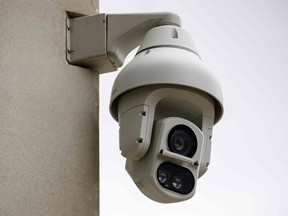Opinion: Granting the police access to more than 200 traffic cameras in Vancouver represents a significant step toward mass surveillance.

Article content
Vancouver city council’s recent decision to “confirm its interest” in granting the police access to more than 200 traffic cameras represents a significant step toward mass surveillance — one that should concern all Canadians.
This move raises profound concerns about privacy, civil liberties, oversight of artificial intelligence in policing and the creeping normalization of surveillance in public spaces.
Advertisement 2
Article content
Every day, millions of Canadians walk, cycle or drive by traffic cameras without a second thought. Until now, Vancouver has assured the public that these feeds were “not recorded or stored for after-the-fact investigative purposes” and were only used to monitor and manage traffic conditions in real-time.
The new proposal would hit the record button on these cameras and open them up to real-time and historical use by law enforcement — effectively turning Vancouver’s streets into sites of constant surveillance.
We are told details of exactly when and how police could access footage are to be determined. The police claim that this access would help manage incidents, locate missing persons and investigate crimes.
But these justifications, while emotionally compelling, are insufficient to warrant a surveillance apparatus of this scale.
No concrete evidence has been provided to demonstrate that constant video monitoring would significantly enhance public safety, let alone justify the invasion of privacy. Moreover, if footage is to be stored indefinitely, there are serious questions about how this massive volume of personal data would be processed and protected from misuse.
Article content
Advertisement 3
Article content
This development must also be seen in the broader context of surveillance controversies across Canada. For example, in 2020, the RCMP, Toronto Police Service and other police forces — including one instance involving the Vancouver Police Department — were caught using the controversial Clearview AI facial recognition software, which scraped billions of images from social media without users’ consent.
The privacy commissioner deemed this use unlawful, and it eroded public trust in how law enforcement handles sensitive information. While other police departments responded by introducing new policies and transparency disclosures for new technologies, the VPD has yet to adopt similar measures.
With access to city traffic cameras, the temptation to integrate AI technologies will inevitably arise. Tools such as automated licence plate readers and facial recognition are already in use around the world. Once the data begins flowing, it’s easy for police to argue they need AI-based solutions under the guise of efficiency and resource management. Yet these technologies are far from foolproof, disproportionately misidentifying racialized individuals, and introducing significant risks of abuse and error.
Advertisement 4
Article content
Surveillance of this kind doesn’t just gather data — it risks chilling public life. When people know they’re being watched, they may hesitate to participate in protests, limit their associations and self-censor their behaviour — threatening core freedoms of expression and assembly that are protected under the Charter of Rights and Freedoms.
Equally troubling is the risk of “scope creep,” where systems introduced with limited purposes inevitably expand. Imagine if there were no traffic cameras in our city, and the police suddenly proposed installing hundreds of them for police use. Many people would likely balk at such a plan, seeing it as a step toward a police state. Yet, by gradually expanding the role of existing infrastructure, authorities avoid scrutiny and normalize practices that would otherwise be unacceptable.
Data security is another critical concern. Even the most secure government systems are vulnerable to hacking and misuse, as seen in recent breaches across Canada. Granting police access to vast amounts of video footage exposes the personal data of thousands of people to potential theft and abuse.
Advertisement 5
Article content
This shift toward surveillance in Vancouver reflects a growing global trend. Around the world, governments are increasingly adopting large-scale surveillance tools integrated with AI analytics, framing them as essential for public safety. But surveillance states erode the very freedoms they claim to protect.
Vancouver’s council should reconsider this troubling plan before it sets a precedent that others follow. People deserve to move freely in their cities, gather without fear, and protest peacefully without worrying that their actions are being recorded and stored indefinitely.
Once these systems are implemented, dismantling them is almost impossible. Now is the time to resist the quiet erosion of privacy and trust before it becomes Canada’s new normal.
Benjamin Perrin is a law professor at the University of B.C. and leads the UBC AI & Criminal Justice Initiative. benjaminperrin.ca/ai
Recommended from Editorial
Bookmark our website and support our journalism: Don’t miss the news you need to know — add VancouverSun.com and TheProvince.com to your bookmarks and sign up for our newsletters here.
You can also support our journalism by becoming a digital subscriber: For just $14 a month, you can get unlimited access to The Vancouver Sun, The Province, National Post and 13 other Canadian news sites. Support us by subscribing today: The Vancouver Sun | The Province.
Article content




Comments